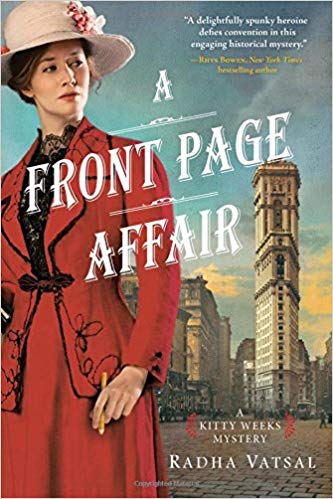Genre: Krimi
GoodReads meta-data is 328 pages, rated 3.6 by 1004 litizens

Verdict: Read all about it!
Capability Weeks, a young woman of nineteen, works for the editor of the Ladies’ Page on the stuffy and staid New York ‘Sentinel’ newspaper in 1915. She and her father, Julian, have only recently returned to the States after decades abroad in Europe and Asia. That experience gives her the caché to land the newspaper job but leaves her unprepared for the manners and mores of the time and place. Though the pair are comfortably well off, Mr Weeks grudging approves of Capability’s work, provided it in no way interferes with her home duties, which fall to her because her mother and his wife died years ago. Later in the book, this need to run the home comes into conflict with her journalistic ambitions.
It was a time of breakneck economic growth, raging war in Europe, submarine attacks in the Atlantic, and a tsunami of immigrants. A volatile mix in the making.
Because it is new to her, Capability observes New York City and its denizens with interest, the skyscrapers, the wind tunnel streets, the underground subway, the class snobbery, the social distance between classes, the profusion of newspapers. All of this brought to the mind the two great chroniclers of the Gilded Age (1880-1917), as the period was later called, Henry James and Edith Wharton, and Capability is no match for either of them. It was a time of rapid economic growth that promised to go on forever, with it streamed millions of immigrants arriving at this new Eden every year. At the same time stupendous wealth was concentrated in the railway and banking barons, a few of whom appear in these pages. (Aside, one of these lesser magnates endowed Duke University where the author of this book obtained a PhD.)
One day the Ladies’ Page editor is indisposed, and sends this ingenue in her place to an elaborate garden party with Japanese daytime fireworks. (A new idea to me which is fully explained in a Wikipedia entry.) While passing among the great and the (not so) good at the party Capability studies them, and has an unpleasant encounter with the penniless scion of a once great fortune, Hunter Cole and his burlesque dancer wife. Capability and the wife hit if off, both being fish out of water in this set. Cole is a rude and crude bore, despite his illustrious forbears. Think of a radio shock jock and there you have him. Seasoned krimi readers will have no trouble in picking him as the first to go, and he does — good riddance — during the fireworks display. Capability may have been the last to see him alive and the first to see him dead.
Because she was there the newspaper editor reluctantly assigns her to assist the male journalist covering murder, but in a very circumscribed role suitable for a woman. She chaffs at that, the more so when she sees how superficial the male journalist approaches the subject. (Ahem, what’s new.)
However the police investigation applies the standard operating procedure of the time and blames Hillary Clinton. (Just joking to see if the reader is paying attention.) No the SOP is to find the nearest immigrant who barely speaks English, in this case an Italian stable hand, and pin the crime on him and beat a confession out of him. This satisfies the police and the journalist, but Capability finds it a long bow.
The book is rich in the detail of life in that rarefied stratum, time, and place, which is seen afresh, if not with the wit and insight of James or Wharton. For example, Capability is assigned an interview with Miss Anne Morgan (yes, of that Morgan family) about her book ’The American Girl: Her Education, Her Responsibility, Her Recreation’ (1915) who like a Hollywood star today displays celebrity compassion for working women. However Capability and this reader, too, found Miss Morgan to be streets ahead of them. That was refreshing. In so many krimi writers there is the ambition to write social criticism by portraying others, especially the rich, the famous, the successful, as grasping dunderheads and imbeciles. Not so here. Miss Morgan knows herself, including her own blind spots. Woe to a journalist who tries to trip her up.
Likewise Capability’s chance encounter with a German diplomat is very well presented. He may be up to shady things but he is no cardboard stereotype, and when called to account for his actions, makes a cogent statement.
Another compensation is the broader canvas the novel offers, no character in a James or Wharton book ever spoke to a stable hand, an Italian immigrant, or visited the Tombs (if one does not know what this is, look it up because it still exists, or did when I saw it in 1980).
In this era everyone is addressed in every exchange by title, thus ‘Miss Weeks.’ While I am sure that is accurate, it is tedious to read, like those rituals of formality that plump up Alexander McCall Smith’s slender stories. The constraints on women are many and they are made apparent but not to a didactic drumbeat of hindsight such as is found in other krimis that want to offer a discounted, hindsight social criticism, i.e., for the author to display peacock feathers of virtue.
The author distinguishes characters, offers their distinct perspectives, and steers on without losing focus. This is the first in a series.

Radha Vatsai
Bones to pick, I have a few, somewhere along the way Capability becomes Kitty to friends and family. Yes, the name does refer to the gardener though why did not register with me.
Skip to content
